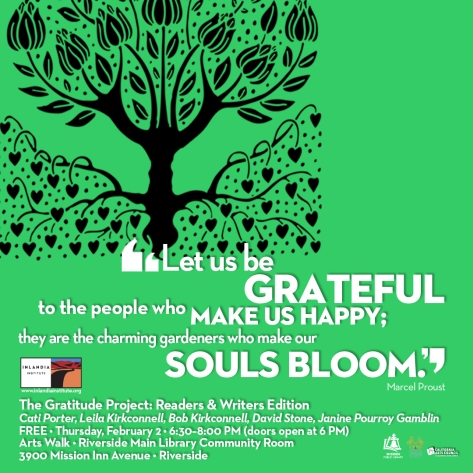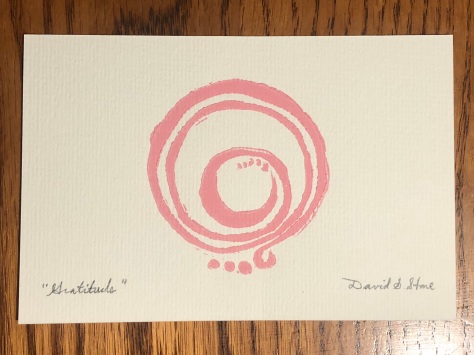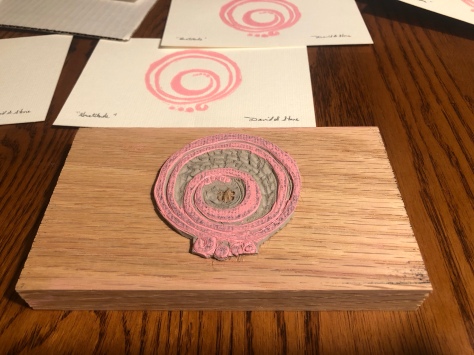
Category Archives: Southern California Writers
Gratitude Postcards

I carved a block with the international gratitude symbol and printed it in pink, a color associated with gratitude. I want to provide guests at the upcoming Riverside Arts Walk who attend Inlandia’s panel discussion at the library an opportunity to express their gratitude to a writer through a postcard.

Thursday, February 2, 2023
First Thursdays Arts Walk
“The Gratitude Project: Readers & Writers Edition”
with Janine Pourroy Gamblin, Cati Porter, Leila Kirkconnell, Robert Kirkconnell, and David Stone
Riverside Main Library
3900 Mission Inn Blvd
Riverside, CA 92501
Doors Open at 6:00 PM
6:30-8:00 PM
Free and open to the public.
Is gratitude part of what it takes to build a writer’s life? We think so.
In reading and writing, as in life, we don’t often take the time to tell people how much they – and their work – mean to us. Join Inlandia and a gathering of IE writers to learn how to weave together a literary life, and discover ways readers and writers can express gratitude for one another while doing so.
Wild Embrace

I first heard Tim Hatch when he was a graduate student at Cal State SanBernardino and was impressed. Tim was a stranger to me then, whose towering stature made me feel small even though I am basically six-feet tall. The power and the coarse experiences Hatch’s poems often describe may not be unexpected from a man of such stature, but it is the profundity of his emotional insights that stick with those who hear or read his work. Many of the poems in this collection depict the trauma Hatch experienced as the son of an alcoholic father. The hope in these poems comes in the clarity with which the speaker portrays his experiences and the compassionate spirit that shines through in poems such as “Helping John Piss” and “Breathe Him Close.”
Veterans Day Column
I often discover inspiring reads in the new books section at The A. K. Smiley Library in Redlands, CA. Adam Sol’s “How a Poem Moves” started me thinking about what to write for my Inlandia Literary Journeys column that was scheduled to appear in print just before Veterans Day.

Published in Canada, Sol’s book may be purchased online or ordered from your local book store. The book may be marketed to readers of poetry, but will inspire many a poet to consider the moves they might make with their own poems. Sol maintains a blog by the same name as the title of his book.

Taken with Lucia Galloway‘s “Ten Miles from Home” while reading her new book “Some Words for Meanwhile,” I was excited when I learned she would be reading at the DA Arts Center in Pomona. At her reading I asked her if I might use her poem for my Veterans Day column. She agreed and kindly added the poem to the poems she read that evening.

My column, “How a poem captures the dissonance of drone warfare” appeared in four of the Southern California News Group’s papers: The Press Enterprise, The Redlands Daily Facts, The Sun, and The Inland Valley Bulletin.

On Sunday, November 10, 2019, the column ran in the print editions. I enjoy driving around the region to purchase a copy of each of the papers to see how they varying in their presentations.

I allude to the British World War I poet Wilfred Owen in my column. For my undergraduate thesis to earn my BA in English, I utilized James Fowler’s faith development theory to analyze the life of Owen and consider how his transitioning stages of faith appeared in his poetry. I was privilege to meet one of the major Owen biographers and scholars, Dominic Hibberd, when he came to Atlantic Union College to visit with Professor Deborah Leonard who had taught with him in China. Ms. Leonard served as advisor to my thesis.
Open Words

Enjoyed reading for the first time at the Open Words poetry reading I wrote about for the newspaper back in May. Located at the Ironbark Ciderworks in Claremont, this open mic reading occurs on the first Sunday of each month.

Mari (pronounced like Marie) Werner and Terry Wilhelm organize the reading. One of them typically starts the evening to warm up the crowd and the other closes the reading.


I arrived about ten minutes before the reading began and was about the eighth reader to sign-in. The dozen or so readers for the evening showed a wide array of comfort and skill. The audience facing the microphone and the general customers were audibly receptive to all. It’s a great venue for both the novice and seasoned poet to read.


Ironbark provides a vivid, artistic environment for a poetry reading. The staff were friendly and helpful (I think one of the staff was even a reader), but not obtrusive. A teetotaler like myself felt no pressure to drink. Other readers shared how much they enjoyed the fermented cider offerings. I only wished Ironbark sold food as well as beverages.

After the reading, the closing host encourages the audience to share news of upcoming local poetry readings and publishing opportunities. Mari noted Karen Maya-Greenbaum in the audience and suggested the Fourth Sundays Poetry Readings at the Claremont public library. Victoria Waddle, Managing Editor of Inlandia: A Literary Journey, encouraged the readers to submit to the adult edition of the online journal before the August 31st deadline.
Inlandia Literary Journeys Column on Claremont Poetry Readings
My latest column for the Southern California News Group highlights the Open Words and Fourth Sundays poetry readings in Claremont. The column ran in the Sunday, May 12, 2019 editions of The Inland Valley Bulletin, The Press-Enterprise, The Redlands Daily Facts, and The Sun.
“To hear the diverse voices of Southern California’s poets and beyond, head to Claremont, a town that values poetry.”

Riding the Flexible Flyer
 Tuesday, June 19th may have been a typical hot day in Riverside, but I escaped the heat with over twenty of Celena Diana Bumpus’s poetry students and guests at the second reading in the Tuesday Literary Series at the Janet Goeske Center in Riverside, California.
Tuesday, June 19th may have been a typical hot day in Riverside, but I escaped the heat with over twenty of Celena Diana Bumpus’s poetry students and guests at the second reading in the Tuesday Literary Series at the Janet Goeske Center in Riverside, California.
Ms. Bumpus leads a highly engaged group at the Goeske Center for an hour-and-a-half long workshop each Tuesday afternoon from 1:00 to 2:30, one of the Center’s many free lifelong learning options.
I shared forty short poems from my current manuscript, including “Riding the Flexible Flyer,” which tells the story of a memorable childhood sled ride. You can see my splayed hands and bent knees in the photo above as I describe the launch of my sled. Nothing like a fanciful winter poem and a well-airconditioned room to help one forget the wilting temperatures outside.
My poems explore nature, time, and family relationships with images from my rural childhood in Northeastern Pennsylvania and from Southern California’s Inland Empire where I’ve lived for nearly twenty years.
After reading I enjoyed conversation with the group about my poems and the craft of writing.
I look forward to hearing Michelle Gonzalez read on July 10 at the third presentation in the Tuesday Literary Series organized by Bumpus’s Islands for Writing Publishing. Tim Hatch will read on August 7.
2017 Writing from Inlandia Reading
Since my plans to travel this weekend had only recently changed and I had not signed up to read, I went to the reading for the 2017 Writing from Inlandia today to listen to other local writers and not to read myself. However, just as the last scheduled reader was preparing to read, I was urged to follow her at the podium.
I shared three of the five poems I have in this new anthology:
Standing Ground
Rest in the Grove
Hope
Two Hollows on a Hill
At Last a Black Lily
“Birdie, birdie, birdie, / calls the cardinal,” I chirped out as I began “Standing Ground,” which features the territorial calls of a cardinal perched above a hanging carcass. My mother loved cardinals. She would have hated this poem. “Why write about such a gruesome scene?” she would have said, but she was not there. She and my father were interred at Hickory Grove Cemetery just two weeks ago. My mother passed early in January and my father less than a year earlier.
I struggled to lift my eyes to face the audience. Maintaining periodic eye contact while reading is a part of my daily routine. I’m a teacher. But I found myself desperately struggling to maintain composure as I thought of my parents.
As I read the dedication, “for Benjamin Mileham Stone,” I felt my voice begin to waver. I came close to crying, but made it through the poem. “Rest in the Grove.”
I hadn’t introduced the poem, but after a deep breath at its end, I shared about the recent loss of my parents, feeling a need to explain my quavering. The compassionate faces I saw in the audience, many who I have known for years now, steadied my nerves and voice as I read through the four stanzas of “At Last a Black Lily,” which reflects on the death of a raven from the West Nile virus. Rest and beauty came for the bird in my poem as courage and peace came for me. I am grateful for the community of writers I’ve come to know through the programs of the Inlandia Institute.
Keeping Up Communication

I just finished reading Margarita Engle’s Enchanted Air: Two Cultures, Two Wings: A Memoir. Engle magically describes her childhood and early teen years as she travels between California and Cuba just before the Cuban Missile Crisis.
In light of the current attack on media, I was heartened by the closing lines of her poem “Secret Languages”:
“Right wing or left wing, tyrants always
try to control communication.
They always
fail.”
Charlotte Davidson’s March 2nd column in The Press Enterprise, “Get busy writing if you dislike today’s political situation,” also gave me courage to continue to write.
Whatever one’s perspective in these fast-moving tumultuous times, the opportunities to make or to record history present themselves daily. I need to write more. Thank you, Margarita and Charlotte, for reminding me of the pendulum swings of history and the importance of communication.
2016 San Gabriel Valley Literary Festival

I will be reading at the San Gabriel Valley Literary Festival as one of Inlandia Institute’s featured readers. Poet Brutus Cheiftain will emcee the 12:30-1:30 Inlandia Presents segment on Saturday, February 20. I will be reading with fellow Inlandia A Literary Journey contributor James Ducat and 2015 Hillary Gravendyk Prize winners Angela Ina Penaredondo and Kenji Liu.

